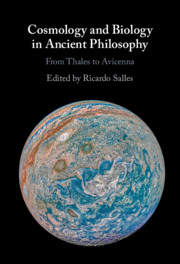Book contents
- Cosmology and Biology in Ancient Philosophy
- Cosmology and Biology in Ancient Philosophy
- Copyright page
- Contents
- Contributors
- Acknowledgements
- Introduction The Intersection of Biology and Cosmology in Ancient Philosophy
- Chapter 1 Souls and Cosmos before Plato
- Chapter 2 The Ensouled Cosmos in Plato’s Timaeus
- Chapter 3 Platonic ‘Desmology’ and the Body of the World Animal (Tim. 30c–34a)
- Chapter 4 The World Soul Takes Command
- Chapter 5 Begotten and Made
- Chapter 6 The De Motu Animalium on the Movement of the Heavens
- Chapter 7 Biology and Cosmology in Aristotle
- Chapter 8 Recapitulation Theory and Transcendental Morphology in Antiquity
- Chapter 9 The Stoics’ Empiricist Model of Divine Thought
- Chapter 10 Why Is the Cosmos Intelligent?
- Chapter 11 Cardiology and Cosmology in Post-Chrysippean Stoicism
- Chapter 12 The Agency of the World
- Chapter 13 God and the Material World
- Chapter 14 At the Intersection of Cosmology and Biology
- Chapter 15 Is the Heaven an Animal?
- References
- Index
- Index Locorum
Chapter 2 - The Ensouled Cosmos in Plato’s Timaeus
Biological Science as a Guide to Cosmology?
Published online by Cambridge University Press: 21 May 2021
- Cosmology and Biology in Ancient Philosophy
- Cosmology and Biology in Ancient Philosophy
- Copyright page
- Contents
- Contributors
- Acknowledgements
- Introduction The Intersection of Biology and Cosmology in Ancient Philosophy
- Chapter 1 Souls and Cosmos before Plato
- Chapter 2 The Ensouled Cosmos in Plato’s Timaeus
- Chapter 3 Platonic ‘Desmology’ and the Body of the World Animal (Tim. 30c–34a)
- Chapter 4 The World Soul Takes Command
- Chapter 5 Begotten and Made
- Chapter 6 The De Motu Animalium on the Movement of the Heavens
- Chapter 7 Biology and Cosmology in Aristotle
- Chapter 8 Recapitulation Theory and Transcendental Morphology in Antiquity
- Chapter 9 The Stoics’ Empiricist Model of Divine Thought
- Chapter 10 Why Is the Cosmos Intelligent?
- Chapter 11 Cardiology and Cosmology in Post-Chrysippean Stoicism
- Chapter 12 The Agency of the World
- Chapter 13 God and the Material World
- Chapter 14 At the Intersection of Cosmology and Biology
- Chapter 15 Is the Heaven an Animal?
- References
- Index
- Index Locorum
Summary
Plato’s cosmology in the Timaeus can be seen as being framed in biological terms, since it claims the universe as a whole to be a living being, more specifically, a created god. In this chapter, I show that the central assumption that leads Plato to understand the created cosmos as a living being is the idea that the world is as good as possible. In a second step, I want to show that this assumption of the world’s bestness is also responsible for two important twists to the biological framing Plato uses. First, being as good as possible also implies that the world is self-sufficient, which means that many of our common biological notions are of no relevance for an account of the cosmos as a living being. Secondly, I show that while Plato gives an account of all kinds of living beings, his assumption of the bestness of the world leads him to be ultimately interested only in rational living beings. Accordingly, what starts out in biological terms turns into a form of rational psychology and rational theology. This will finally lead to a discussion whether Plato works with a consistent notion of life in the Timaeus.
- Type
- Chapter
- Information
- Cosmology and Biology in Ancient PhilosophyFrom Thales to Avicenna, pp. 29 - 45Publisher: Cambridge University PressPrint publication year: 2021

